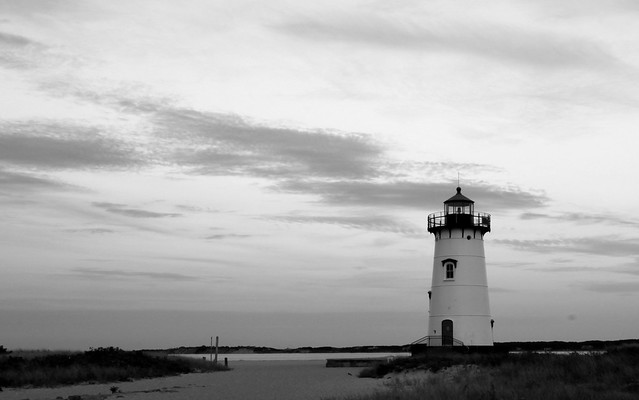Growing up all I wanted to be was a lighthouse keeper. I was always fascinated by how these keepers of the sea warned ships away from treacherous rocks and reached through the night and the fog to guide ships safely on their way. From the ancient Lighthouse of Alexandria to the Fastnet Rock Lighthouse of Country Cork, Ireland to the lighthouse of Edgartown harbor (pictured below) in Martha's Vineyard, MA, USA, these keepers have tirelessly done their job.
Today most ships have navigational devices such as GPS, sonar, and radar combined with detailed ocean charts which greatly reduces their dependence on the lighthouse.
Down through the centuries lighthouses have been a warning to us of the perils of the deep and have kept us safe until we became smart enough to look after ourselves. Today lighthouses still hold that boyhood fascination for me, I like to think they still symbolise a warning to us, a reverse warning now if you will, a warning to take care of our most precious resource, water!
Today most ships have navigational devices such as GPS, sonar, and radar combined with detailed ocean charts which greatly reduces their dependence on the lighthouse.
Down through the centuries lighthouses have been a warning to us of the perils of the deep and have kept us safe until we became smart enough to look after ourselves. Today lighthouses still hold that boyhood fascination for me, I like to think they still symbolise a warning to us, a reverse warning now if you will, a warning to take care of our most precious resource, water!
 |
| Edgartown Harbor Lighthouse, Martha's Vineyard, MA |
Even though water is in plentiful supply, with over 70% of the Earth covered in water, the amount of potable water is only a small fraction of that. Potable water is a precious resource and as the world populations explodes, billions of people lack access to clean water. For a global perspective of this see a recent CNN story titled: The coming water wars?
According to the WHO/UNICEF more people own a mobile phone than have a toilet. This statement alone speaks volumes about our world's water problem. It speaks of issues with water sourcing and distribution, and waste water management and the need to address a global imbalance between technology and basic human needs. Buried in this statement is also one potential solution to some of this imbalance. As our devices become smarter, camera and GPS enabled mobile phones are being used by citizens in developing country to email GPS tagged pictures of broken or leaky water pipes, broken manholes, open sewers etc. This allows for authorities to get up to the minute information on the state of the water infrastructure and prioritize fixing these problems.
Now that I am all grown up I have given up the dream of being a lighthouse keeper. Ten years ago I joined IBM and today I am privileged to be part of a world wide team as the architect for IBM's Intelligent Water product. In this blog I will explore this product and how we are looking to address some of the major world water problems. Together we will explore terms like the Water Information Hub (the technology at the heart for IBM's Intelligent Water Product), non revenue water (leaks), equitable water (making sure everyone has enough), waste water, and water quality as well as many more.
I hope you will follow along on this exciting journey with us and help make this world a smarter planet, a planet we will be proud to hand on to our children.
According to the WHO/UNICEF more people own a mobile phone than have a toilet. This statement alone speaks volumes about our world's water problem. It speaks of issues with water sourcing and distribution, and waste water management and the need to address a global imbalance between technology and basic human needs. Buried in this statement is also one potential solution to some of this imbalance. As our devices become smarter, camera and GPS enabled mobile phones are being used by citizens in developing country to email GPS tagged pictures of broken or leaky water pipes, broken manholes, open sewers etc. This allows for authorities to get up to the minute information on the state of the water infrastructure and prioritize fixing these problems.
Now that I am all grown up I have given up the dream of being a lighthouse keeper. Ten years ago I joined IBM and today I am privileged to be part of a world wide team as the architect for IBM's Intelligent Water product. In this blog I will explore this product and how we are looking to address some of the major world water problems. Together we will explore terms like the Water Information Hub (the technology at the heart for IBM's Intelligent Water Product), non revenue water (leaks), equitable water (making sure everyone has enough), waste water, and water quality as well as many more.
I hope you will follow along on this exciting journey with us and help make this world a smarter planet, a planet we will be proud to hand on to our children.



